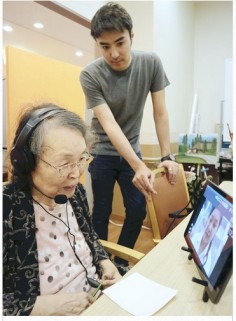▼ Elderly People Teach Japanese Through IT
- Category:Other
CHIBA — An information technology company based in Kashiwa, Chiba Prefecture, has started employing elderly people to teach Japanese to people overseas via online video calls.
The aim is to connect elderly people who tend to become isolated, such as those living in nursing homes, with foreigners who have few opportunities to study Japanese with a native speaker.
So far, both the teachers and the students seem to be enjoying themselves and making friends.
“September is a rainy month in Japan because of the typhoons. Do typhoons come to Thailand?” Teru Morisawa, an 87-year-old who lives alone in housing for the elderly in Kashiwa, asked a student in Thailand during a video call made on a tablet computer on Sept. 21.
“Sometimes, but not as often as Japan,” answered the student, a 22-year-old who studies Japanese at a university in Bangkok.
For about 30 minutes, they spoke in Japanese about Morisawa’s hobby of writing haiku and the foods they liked.
“I don’t have many Japanese friends, so I’m happy to actually speak Japanese,” the student said.
Morisawa taught three classes that day. “Helping people learn Japanese is a worthwhile thing to do. I never thought I’d get to know foreigners at this age,” she said joyfully.
The project, which was launched free of charge on a trial basis in August, is the brainchild of Manabu Goto, the 25-year-old president of Helte Co., an IT company based in Kashiwa.
When Goto was a university student, he sometimes spoke by video call with a woman living in a U.S. nursing home that his mother knew through work. Then when traveling in Southeast Asia, he met a number of young people who said they were studying Japanese but had few opportunities to practice.
Eventually, he came up with the idea to connect elderly people in Japan with young people overseas, and started his company.
He installed a system that displays large-size text on the tablets to make them easier for elderly people to use. He visited elderly housing facilities, nursing homes and other places in the city to generate interest.
Currently, Goto is working with 11 elderly people at three facilities. It was his impression that many young people in Thailand were studying Japanese, so he reached out to universities in Bangkok and elsewhere and made agreements with them.
According to the Japan Foundation, an independent administrative agency, there were about 3.99 million people studying Japanese overseas as of fiscal 2012, an increase of about 300,000 people since fiscal 2009.
Goto would like to expand the number of users through such measures as having domestic nursing homes sign contracts with universities abroad, which in the future could be turned into a business.
“I’d like to create a place where various people can connect and overcome the differences of age and nationality,” Goto said.
The aim is to connect elderly people who tend to become isolated, such as those living in nursing homes, with foreigners who have few opportunities to study Japanese with a native speaker.
So far, both the teachers and the students seem to be enjoying themselves and making friends.
“September is a rainy month in Japan because of the typhoons. Do typhoons come to Thailand?” Teru Morisawa, an 87-year-old who lives alone in housing for the elderly in Kashiwa, asked a student in Thailand during a video call made on a tablet computer on Sept. 21.
“Sometimes, but not as often as Japan,” answered the student, a 22-year-old who studies Japanese at a university in Bangkok.
For about 30 minutes, they spoke in Japanese about Morisawa’s hobby of writing haiku and the foods they liked.
“I don’t have many Japanese friends, so I’m happy to actually speak Japanese,” the student said.
Morisawa taught three classes that day. “Helping people learn Japanese is a worthwhile thing to do. I never thought I’d get to know foreigners at this age,” she said joyfully.
The project, which was launched free of charge on a trial basis in August, is the brainchild of Manabu Goto, the 25-year-old president of Helte Co., an IT company based in Kashiwa.
When Goto was a university student, he sometimes spoke by video call with a woman living in a U.S. nursing home that his mother knew through work. Then when traveling in Southeast Asia, he met a number of young people who said they were studying Japanese but had few opportunities to practice.
Eventually, he came up with the idea to connect elderly people in Japan with young people overseas, and started his company.
He installed a system that displays large-size text on the tablets to make them easier for elderly people to use. He visited elderly housing facilities, nursing homes and other places in the city to generate interest.
Currently, Goto is working with 11 elderly people at three facilities. It was his impression that many young people in Thailand were studying Japanese, so he reached out to universities in Bangkok and elsewhere and made agreements with them.
According to the Japan Foundation, an independent administrative agency, there were about 3.99 million people studying Japanese overseas as of fiscal 2012, an increase of about 300,000 people since fiscal 2009.
Goto would like to expand the number of users through such measures as having domestic nursing homes sign contracts with universities abroad, which in the future could be turned into a business.
“I’d like to create a place where various people can connect and overcome the differences of age and nationality,” Goto said.
- November 5, 2016
- Comment (0)
- Trackback(0)


